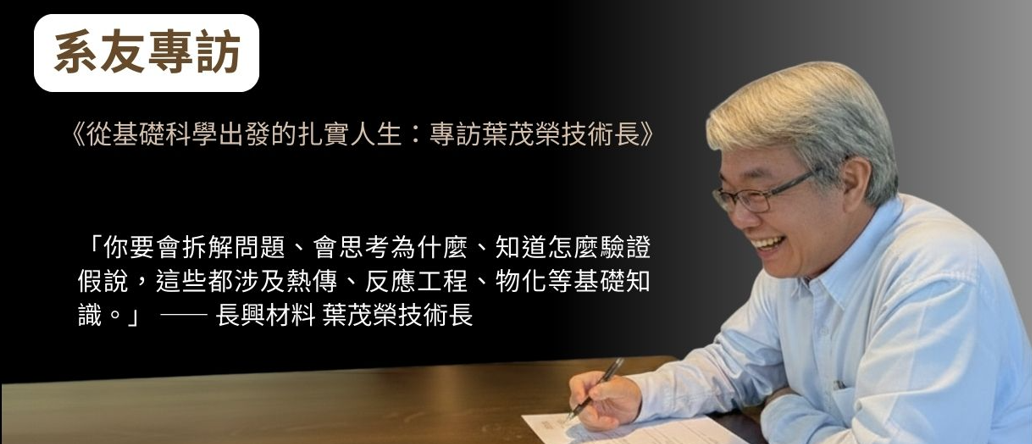Department of Chemical Engineering Doctoral Program Regulations
Preliminary Stipulation on May 19, 1982
1st Revision, April 25, 1983
2nd Revision, April16, 1984
3rd Revision, April 16, 1985
4th Revision, April 15, 1987
5th Revision, January 18, 1989
6th Revision, February 17, 1992
7th Revision, November 8, 1993
8th Revision, August 7, 1995
9th Revision, October 9, 1985
10th Revision, November 16, 1997
11th Revision, April 13, 1998
12th Revision, March 13, 2000
13th Revision, March 12, 2001
14th Revision, July 9, 2002
15th Revision, January 7, 2008
16th Revision, September 8, 2008
17th Revision, July 9, 2012
18th Revision, December 9, 2013
19th Revision, April 10, 2017
20th Revision, October 12, 2020
1. Admission Requirement:
(1) General Graduate Students:Holder of domestic or foreign master's degree approved by the Ministry of Education.
(2) Employed Graduate Students:In addition to the requirements for general graduate students, please refer to the University’s doctoral student recruitment brochure for additional requirements.Examination subjects:
Reviewed: authorship (e.g. thesis, technical reports), letter of introduction and other relevant documents, transcripts, oral test.
(3) Master's program graduates from the Department who have completed the first academic year and scored an average of 80 points and above and have exhibited significant research potential, may apply according to regulations. Following review by the committee and approval by the Department’s academic affairs meeting, the application will be submitted to the Office of Academic Affairs for approval by the President.
2. Program length: 2-7 years
3. Courses and credits: Article 58 of the University’s Academic Affairs Regulations stipulates that:
Excluding the thesis, doctoral students must complete at least 18 credits, of which at least 12 credits must be professional courses. Graduate students directly pursuing a PhD degree must complete at least 30 credits, of which at least 24 credits must be professional courses.
The Department regulations states that:
After admission, doctoral students must complete at least 18 credits, of which at least 9 credits must be courses offered by the Department, in addition to the thesis and seminar (4credits). Graduate students directly pursuing a PhD degree must complete at least 30 credits, of which at least 12 credits must be courses offered by the Department, in addition to the thesis and seminar (4credits).Thesis course is required of doctoral students, and is taken during the second year of the doctoral program. At least 4 semesters of seminar courses are required, and students who do not have a master’s degree in chemical engineering are required to take the required courses in the Department’s master’s program.(Please refer to the Department’s master’s program regulations).
4. Doctoral students must choose a thesis advisor from professors approved by the Department before the end of the first academic year. The advisor cannot be related to the student via spousal, third degree or closer kinship, or in-law relationship. From the second year, the Department head will not sign the elective course selection and qualification exam forms for doctoral students who have not selected their advisor by the end of the first academic year.
5. Doctoral students must meet the following qualification assessment (All doctoral students must pass the assessment by the third academic year following admission or be dropped out).
(1) Required Doctorate Qualification Courses are divided into four major systems:
(A) Transport Phenomena & Unit Operation System: Courses include CHE5050 Advanced Transport Phenomena (graduate course), CHE3520 Transport Phenomena and Unit Operations I (undergraduate course), CHE3530 Transport Phenomena and Unit Operations II (undergraduate course), and CHE3060 Chemical Engineering Unit Operations (undergraduate course).
(B) Chemical Engineering Thermodynamics System: Courses include CHE5010 Advanced Chemical Engineering Thermodynamics (graduate course) and CHE3030 Chemical Engineering Thermodynamics (undergraduate course).
(C) Chemical Reaction Engineering System: Courses include CHE5030 Advanced Chemical Reaction Engineering (graduate course) and CHE3070 Chemical Reaction Engineering (undergraduate course).
(D) Principles of Chemical Engineering System (only offered to doctoral students who are not Chemical Engineering undergraduate majors: Courses include CHE5070 Chemical Engineering Principles I" (graduate course) and CHE5080 Chemical Engineering Principles II (graduate course).
Doctoral students with undergraduate major in chemical engineering (i.e. those who graduated from Group A Courses Program recognized by the Department’s master’s program admission test) must pass at least two of the Systems (A), (B) or (C). In other words, if a student chooses a graduate level course from among a system, the student must obtain a passing grade to pass that system. If the course is an undergraduate course, the student must obtain a passing grade and be in the top 50% (inclusive) of the class to pass that system. Doctoral students who are not Chemical Engineering undergraduate majors must pass System (D). In other words, to pass System (D), a student must pass Principles of Chemical Engineering I and Principles of Chemical Engineering II. Credits for the two graduate courses passed in the above course assessment systems can be counted toward the student’s doctoral credits.
(2) Submit a doctoral thesis research proposal, and upon approval by the Review Committee comprising 3-5 professors, make a public oral presentation and submit to oral examination by the Committee members. The advisor cannot chair the Review Committee. Prepare 5-7 copies of the proposal (one for the student, one for each Committee member, and one for the Institute after the exam), and submit to the Department Office one week before the oral defense. Before the oral defense, the Review Committee Chair shall submit the exam time, venue, topic, student name and list of oral defense committee members to the Department Office, and post public notification. The oral defense is open to teachers and students. A total average of 70 points is the passing grade for the oral defense, and students who fail the exam must wait at least three months before re-take.
6. First foreign language: Must be verified in accordance to Department regulations prior to thesis review.
7. Advisors are in charge of the academics and research of doctoral students. Doctoral students who have passed the abovementioned qualification examination and completed the thesis may apply for thesis review and exam pending advisor approval. Appeals may be made according to separate measures.
8. Please refer to the National Tsing Hua University Academic Affairs Regulations for details on the National Tsing Hua University Regulations on Doctoral Degree Examination.
9. Doctoral thesis must be original research completed by the doctoral candidate. At least one academic paper must be accepted by an internationally known journal before thesis review and oral defense.
10. Before the thesis review and oral defense, the doctoral candidate must be invited to present a public lecture by the Department, an academic conference, or domestic or foreign academic research agency. The lecture content must be related to the doctoral thesis.
11. Other matters shall be handled in accordance to University Regulations on Doctoral Examination.







